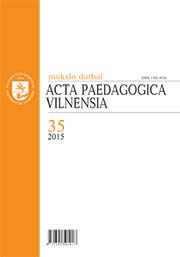Epilepsija sergančiųjų socialinės įtraukties iniciatyva: patirtinis mokymasis dalyvaujant muzikos terapijoje
Initiative of promoting social inclusion of persons suffering from epilepsy: experiential learning of the inclusion through participation in a music therapy group
Author(s): Zita Abramavičiūtė, Vilmantė AleksienėSubject(s): Music, Neuropsychology, Health and medicine and law, Inclusive Education / Inclusion
Published by: Vilniaus Universiteto Leidykla
Keywords: Epilepsy; social inclusion; situated learning; participation; music therapy;
Summary/Abstract: The analysis of scientific literature shows that in Lithuania people with epilepsy face a high risk of social exclusion, and there is a lack of research in which the psychosocial aspects of epilepsy and the possibilities how to optimize the social inclusion of people who suffer from epilepsy would be explored thoroughly. Furthermore, there is no systematic approach to the problem of social exclusion itself, an interdisciplinary work and innovative methods are not integrated into the practice fully. Thus, the problem of the research is actualized by the question – what are the possibilities of applying music therapy in order to optimize the social inclusion of people with epilepsy? A qualitative case study was carried out in order to solve this problem. The results of the study are presented in the form of analysis and interpretation of the social inclusion experiential learning process (a total of 20 sessions) of the music therapy group consisting of 7 adults with epilepsy, and their outcome. The study data consist of the public documents, transcriptions of the group members’ reflections on the activities and audio recordings of the musical improvisations of the group. The data were also collected while observing the process. Musical improvisations were analysed by the application of the phenomenologically inspired microanalysis method and the qualitative content analysis method, was used for the analysis of the reflections. The review of the main theoretical provisions and concepts of the study at the theoretical level allows an assumption that the social inclusion incentive of the people with epilepsy may be encouraged by experiential learning through participation in an experiential learning community (the music therapy group). The amplification of social inclusion shall be attributable to the dynamics of the group members’ participation from the legitimate peripheral towards centripetal (according to Lave, Wenger, 1991). Such a process of change allows the personal development of capacities that help to overcome the participation problems caused by the illness and to realise social agency, thus becoming an active and full-fledged community member. For the purposes of the study, this social inclusion amplification mechanism has been analysed in the context of musical improvisation by attributing to that improvisation the function of community building and consolidation of the membership in it. The interpretation of the microanalysis results of the improvisations (a total of 10 improvisations) confirmed that a sufficiently high degree of social inclusion was reached when improvising in the group. The indications of the above (to be linked with subjective experience while improvising) are as follows: the intensification of positive energy, the feeling of being legitimate and full-fledged members of the group, the sense of solidarity and sociality. Furthermore, the following capabilities demonstrated by the members of the group while improvising were identified: empathy, responsibility, flexibility of the participation, imagination and creativity, tolerance (forbearance), independence and decision-making, proactiveness, solidarity and cooperation, genuine self-esteem and self-confidence. The interpretation of the results of the qualitative content analysis based on the reflections that were relevant to the study identified the following conditions / situations that were created for the personal development of the above listed capabilities: practical experience, confrontation, community experience, spatiality of the participation, acquiring power, overcoming the fear of making mistakes, involvement in the process, meeting the challenge, breaking stereotypes. The interaction of the capabilities and the conditions / situations for their personal development is synergistic. Its effect is the abolition of the barriers to participation giving rise to the implementation of social agency. The re-implementation of social agency is to be treated as an indication of the amplification of centripetal participation that in turn represents an increase in the degree of social inclusion. The presented research opens a perspective for various initiatives of social inclusion of people with epilepsy and outlines the guidelines for the further research in this area. It would be important to investigate: 1) correlations between capabilities demonstrated by the members of the group and environmental conditions and situations, 2) transferability of the capabilities demonstrated by the members of the group and the conditions and situations created in the group for the development of the identified capabilities to the broader social context, 3) the impact of music therapy on the treatment of epilepsy, including neurophysiological and / or neuropsychological aspects of the disease.
Journal: Acta Paedagogica Vilnensia
- Issue Year: 2015
- Issue No: 35
- Page Range: 113-131
- Page Count: 19
- Language: Lithuanian

